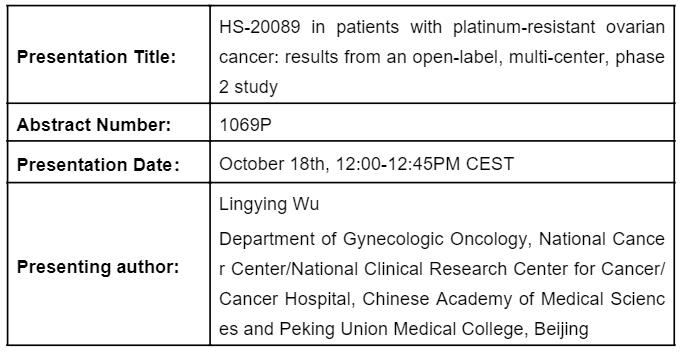
The investigational B7-H4–targeted antibody–drug conjugate HS-20089 demonstrates encouraging efficacy and manageable safety in patients with platinum-resistant ovarian cancer.
Hansoh Pharmaceutical Group Co., Ltd. (Hansoh Pharma, 03692.HK) today announced positive phase 2 study findings of HS-20089, a B7-H4-targeted Antibody-drug Conjugate, in patients with platinum-resistant ovarian cancer (PROC). The findings are being presented in a poster session at the European Society for Medical Oncology 2025 Annual Meeting (October 17-21, Berlin, Germany).

This was a multicenter, open-label, phase 2 study evaluating the efficacy, safety, pharmacokinetic profile, and immunogenicity of HS-20089 injection in patients with recurrent or metastatic ovarian and endometrial cancer. Eligible patients were enrolled to receive 4.8 mg/kg HS-20089 every 3 weeks. Although the samples were collected to test B7-H4 expression, patients were not selected based on B7-H4 expression levels. The primary endpoint was investigator-assessed objective response rate (ORR) according to RECIST v1.1. The results of Cohort 1 are reported and the data cut–off date was June 20th, 2025.
Study results showed:
● Heavily pretreated PROC patients:At data cut-off, 33 patients with high-grade serous ovarian cancer were enrolled and received at least one dose of HS-20089, comprising the safety set. All patients were heavily pretreated, with a median of 3 prior lines of anti-tumor therapy and 45.5% of patients had a platinum free interval of 3 months or less.. 72.7% patients had been treated with bevacizumab, and another 72.7% had received a PARP inhibitor.
● Promising primary results:The efficacy was analyzed in all patients who received treatment, with a median follow-up time of 11.5 months. Treatment with HS-20089 showed promising efficacy in patients with PROC, with a confirmed ORR of 48.5% and DoR of 6.8 months, a mPFS of 6.4 months and a mOS of 14.6 months. B7-H4 was found to be highly expressed in PROC, however, no no significant correlation was observed between B7-H4 expression levels and treatment response to HS -20089..
● Manageable safety profile: The observed safety profile of HS-20089 was consistent with data from the phase 1 study, with no signals of interstitial lung disease.
An encored oral presentation of the findings from HS-20089 will be delivered at the IGCS 2025 Annual Global Meeting, which is to be held at the Century City Conference Centre in Cape Town, South Africa, from November 5 to 7, 2025.
About HS-20089
HS-20089 is a B7-H4-targeted ADC self-developed by Hansoh Pharma. As of now, HS-20089 has entered phase III clinical research for the treatment of the platinum–resistant ovarian cancer indication in China and currently is also undergoing PoC clinical studies for the treatment of endometrial cancer and other solid tumors.
In October,2023,Hansoh Pharma entered into an exclusive license agreement with GlaxoSmithKline Intellectual Property (No.4) Limited (“GSK”), granting GSK an exclusive worldwide license (excluding the Chinese Mainland, Hong Kong, Macau, and Taiwan) to develop, manufacture and commercialize the Product(also known as GSK5733584.GSK is advancing GSK5733584 through a global development programme, with Phase I trials underway globally that includes the BEHOLD-1 (NCT06431594) and BEHOLD-2 (NCT06796907) studies.
In May 2025, HS-20089 was approved by the NMPA as a Breakthrough-Therapy-Designated Drug, with the proposed indication for platinum-resistant recurrent epithelial ovarian cancer, fallopian tube cancer, or primary peritoneal cancer.
About Ovarian Cancer
Ovarian cancer (OC) is one of the most prevalent gynecological malignancies. In 2022, approximately 324,603 new cases of ovarian cancer were diagnosed worldwide, making it the eighth most common malignancy among women. With around 206,956 deaths that year, ovarian cancer was the eighth leading cause of cancer-related mortality among female patients. In China, the incidence in 2022 was 61,060, with a mortality of 32,646.
The current standard treatment for ovarian cancer involves surgery combined with platinum-based chemotherapy. However, most advanced-stage patients relapse within 3 years and eventually develop drug resistance to platinum-based chemotherapy. The clinical treatment methods and efficacy for platinum-resistant recurrent ovarian cancer (PROC) remain extremely limited.
Recent Phase III randomized controlled trials show that the ORR for non-platinum monotherapy chemotherapy is 4%–15.9%, with a median PFS of 3.4–3.98 months. In patients who have received 1–2 lines of prior treatment, non-platinum chemotherapy combined with bevacizumab yields an ORR of 27.3%, extending the median PFS to 6.7 months and the median OS to 16.6 months. Despite a significant extension in PFS, no notable OS benefit is observed compared to non-platinum chemotherapy[2-6].This disease represents a major unmet clinical need, underscoring the urgent demand for more effective treatment approaches.





